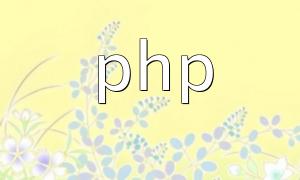In PHP programming, conversion between integers and strings is a basic yet crucial topic, especially when handling user input and database interactions. Understanding these conversions helps developers manage data more efficiently and ensures the stability and performance of applications. This article will explore how to perform integer and string conversions in PHP with concrete examples.
In PHP, an integer (int) is a basic data type used to represent whole numbers, while a string (string) is used to represent textual data. When there is a need to convert between integers and strings, PHP typically performs automatic type conversion. Although PHP’s automatic type conversion makes the code more flexible, developers should understand how to manually control these conversions to prevent potential errors.
Converting an integer to a string is quite simple. The most common approach is to directly assign the integer value to a string variable. Here's an example:
In the above code, we use type casting to convert the integer variable to a string and then output it using the echo statement.
Converting a string to an integer is just as simple. You can use either type casting or the built-in intval() function. Here are two common methods:
In this code, we demonstrate two ways to convert a string to an integer. Both methods give the same result.
When converting from a string to an integer, the content of the string significantly affects the result. For example, if the string starts with a number followed by letters, PHP will only extract the initial digits.
In this example, when the string “789abc” is converted to an integer, the result is 789, and the “abc” part is ignored.
If the string is empty or cannot be converted to a valid number, the conversion result will be 0. This is important to watch out for when handling user input.
In this case, an empty string is converted to 0, which may lead to unexpected behavior. Developers need to be cautious of such scenarios to avoid logic errors.
In PHP, conversion between integers and strings is a fundamental skill. By understanding the basic methods and considerations for integer and string conversion, developers can handle data more effectively and avoid common mistakes. Mastering these techniques is essential for PHP developers to ensure code stability and performance.









